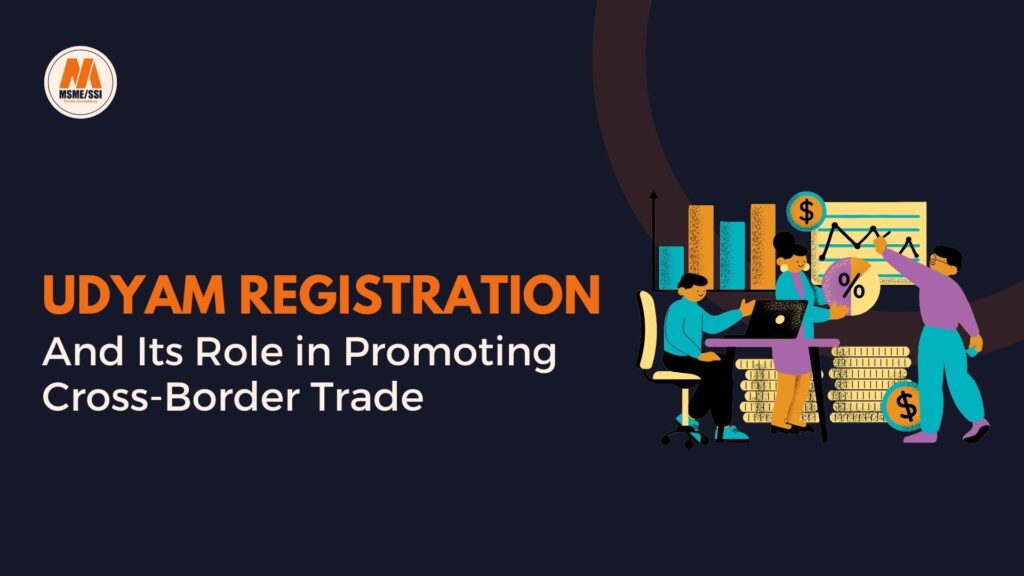Micro, Small, and Medium Enterprises (MSMEs) play a crucial role in the economic development of India, contributing significantly to employment, industrial output, and exports. However, for these businesses to thrive, they need support systems that help them overcome barriers to market access, compliance, and finance. One such initiative that aims to empower MSMEs is the Udyam Registration, a simplified registration process introduced by the Ministry of Micro, Small, and Medium Enterprises in July 2020. While it primarily aims at formalizing the MSME sector, the Udyam Registration has far-reaching implications for promoting cross-border trade. This article delves into how Udyam Registration is becoming a catalyst for Indian MSMEs to explore and excel in international markets.
What is Udyam Registration?
Udyam Registration is an online registration platform introduced to streamline the process of registering MSMEs in India. It replaces the earlier systems of EM-I, EM-II, and Udyog Aadhaar Memorandum (UAM) with a single, user-friendly portal. The new system is designed to provide each MSME a unique identification number known as the Udyam Registration Number (URN), which serves as proof of recognition. This digitized approach reduces paperwork and ensures greater transparency and accountability, making it easier for businesses to access various government schemes and benefits.
Key Benefits of Udyam Registration for MSMEs
Udyam Registration is not just a compliance tool; it is a gateway for MSMEs to unlock a host of benefits that can elevate their operational and financial capabilities. Some of the significant benefits include:
Access to Financial Schemes:
MSMEs registered under Udyam can avail benefits such as low-interest loans, priority lending, and subsidies under various government schemes. These financial incentives are vital for businesses looking to scale up their operations and meet the demands of international trade.
Market Facilitation:
Udyam-registered MSMEs gain easier access to the Government e-Marketplace (GeM) and other procurement portals. This provides a platform for smaller firms to compete for government contracts, which can further establish their credibility in international markets.
Protection Against Delayed Payments:
Registered MSMEs receive legal protection against delayed payments through mechanisms such as the MSME Samadhaan. This ensures improved cash flows, a critical factor for firms engaged in cross-border trade.
Export Promotion and Assistance:
The Udyam Registration opens doors for MSMEs to avail export subsidies, market promotion schemes, and access to international trade fairs, which helps them build networks and expand their market reach globally.
How Udyam Registration Facilitates Cross-Border Trade
The Udyam Registration system is instrumental in promoting cross-border trade for Indian MSMEs in several ways. It simplifies compliance, enhances visibility, and provides financial and logistical support, making it easier for smaller firms to enter and compete in international markets. Some of the key contributions include:
Enhanced Credibility and Global Recognition
Having a registered status under Udyam provides MSMEs with a stamp of legitimacy, which is crucial when engaging in cross-border transactions. It helps foreign buyers, investors, and partners view these enterprises as reliable and trustworthy. Moreover, the unique URN acts as a globally recognizable identifier, simplifying international dealings and enhancing the credibility of Indian MSMEs in overseas markets.
Facilitating Access to Export Incentives
The Udyam Registration system is integrated with other government databases and export promotion schemes such as the Export Promotion Capital Goods (EPCG) scheme, Merchandise Exports from India Scheme (MEIS), and Interest Equalization Scheme for MSME exporters. Through these programs, Udyam-registered MSMEs can gain access to duty reductions, export subsidies, and low-cost credit, reducing the cost of their products in international markets and enhancing their competitiveness.
Integration with Trade Facilitation Platforms
Udyam Registration integrates seamlessly with other platforms like the Directorate General of Foreign Trade (DGFT) and the Export Credit Guarantee Corporation of India (ECGC). This integration simplifies the process of obtaining the Import Export Code (IEC), which is mandatory for any business engaged in cross-border trade. Additionally, the ECGC provides insurance and risk cover to exporters, further reducing the financial risks associated with international trade.
Boosting Market Access Through Trade Fairs and Exhibitions
The Ministry of MSME, in collaboration with international trade bodies, often facilitates Udyam-registered MSMEs to participate in global trade fairs and exhibitions. These platforms provide smaller firms the opportunity to showcase their products, forge new business partnerships, and gain insights into international market trends. Such exposure is crucial for MSMEs looking to expand their reach beyond the domestic market.
Simplified Compliance and Reduced Transaction Costs
Cross-border trade requires adherence to multiple regulations, including customs procedures, export documentation, and quality standards. For many MSMEs, navigating these complexities can be a significant barrier. Udyam Registration helps simplify compliance by integrating various processes under a single umbrella, reducing the bureaucratic burden. Furthermore, registered MSMEs can avail benefits like fast-track customs clearance and lower transaction costs, making it easier to conduct cross-border operations.
Access to Trade Financing and Credit Insurance
One of the biggest challenges faced by MSMEs in cross-border trade is access to affordable trade finance. Udyam Registration addresses this gap by enabling easier access to schemes like the Trade Receivables Discounting System (TReDS) and offering financial support through the Small Industries Development Bank of India (SIDBI). These facilities provide MSMEs with the working capital needed to fulfill international orders, while also protecting them from payment defaults through credit insurance.
Challenges Faced by Udyam-Registered MSMEs in Cross-Border Trade
Despite the numerous benefits, there are still some challenges that Udyam-registered MSMEs face when it comes to expanding into international markets. Key issues include:
Lack of Awareness: Many MSMEs, especially in rural areas, are still unaware of the benefits of Udyam Registration and the various schemes available for export promotion. This lack of awareness can hinder their ability to utilize these resources effectively.
Regulatory Complexity: While Udyam Registration simplifies the domestic compliance process, international trade regulations can still be daunting for small businesses. Understanding and complying with foreign trade laws, tariffs, and quality standards require specialized knowledge and resources.
Limited Technological Capabilities: To compete in international markets, MSMEs need to adopt advanced technologies for production, quality control, and digital marketing. However, many small enterprises lack the financial resources or technical know-how to implement these changes.
Logistics and Supply Chain Barriers: Efficient supply chain management is critical for cross-border trade, but many MSMEs struggle with inadequate logistics infrastructure and high shipping costs, making it difficult to deliver products on time.
Note: Apply for Print Udyam Certificate through the official portal.
Conclusion
Udyam Registration is a transformative step in formalizing the MSME sector and enhancing its potential to contribute to cross-border trade. By providing financial, legal, and promotional support, the Udyam system empowers MSMEs to explore international markets with greater confidence. However, for its full potential to be realized, it is essential to raise awareness about the benefits of Udyam Registration, simplify the compliance process further, and address challenges like access to finance and technological upgradation.
With continued efforts from the government and industry stakeholders, Udyam Registration can become a cornerstone of India’s strategy to increase its share in global trade, transforming MSMEs into dynamic players on the international stage. As more enterprises leverage this platform, Indian MSMEs will not only contribute to economic growth domestically but also establish a strong presence in global value chains.



